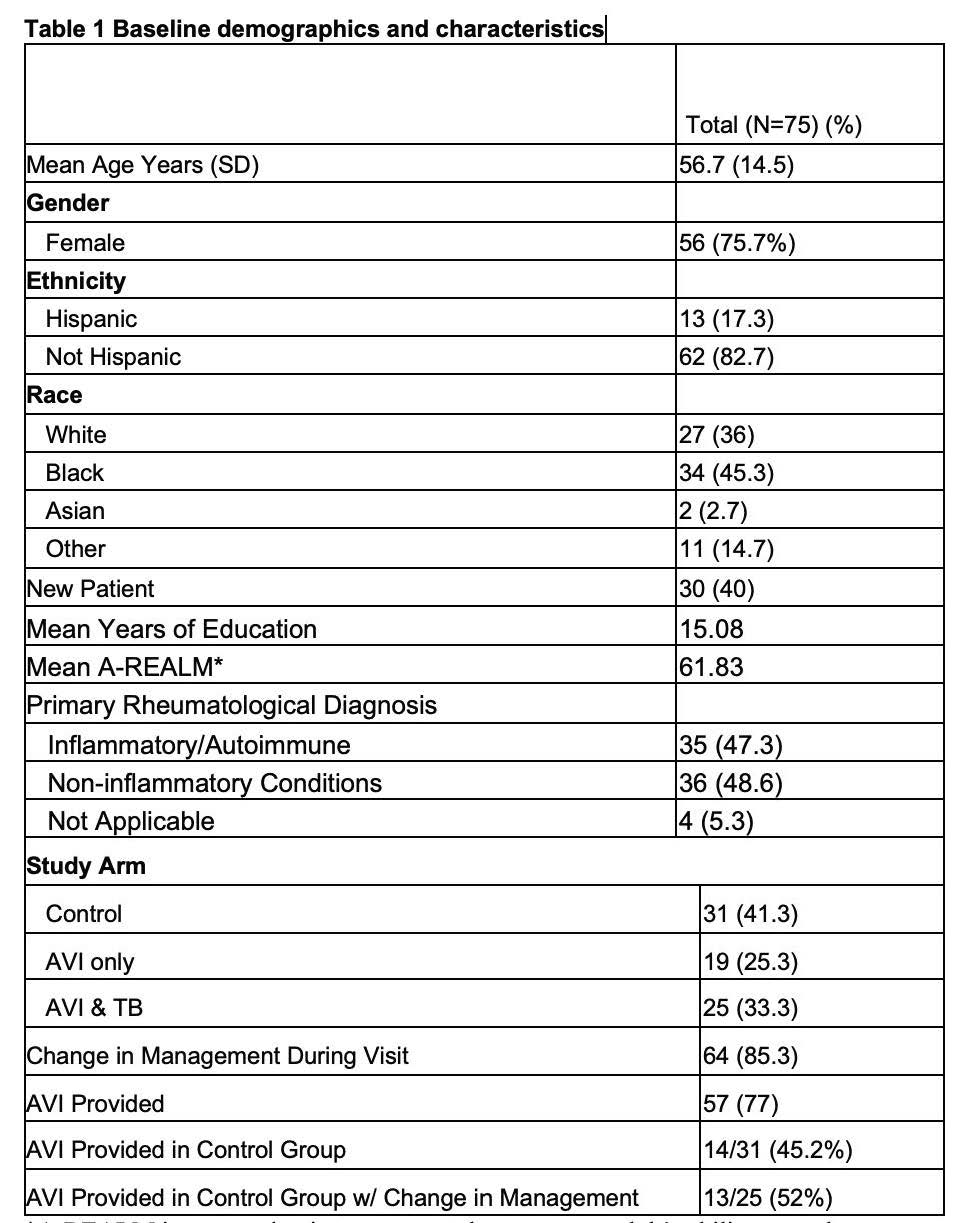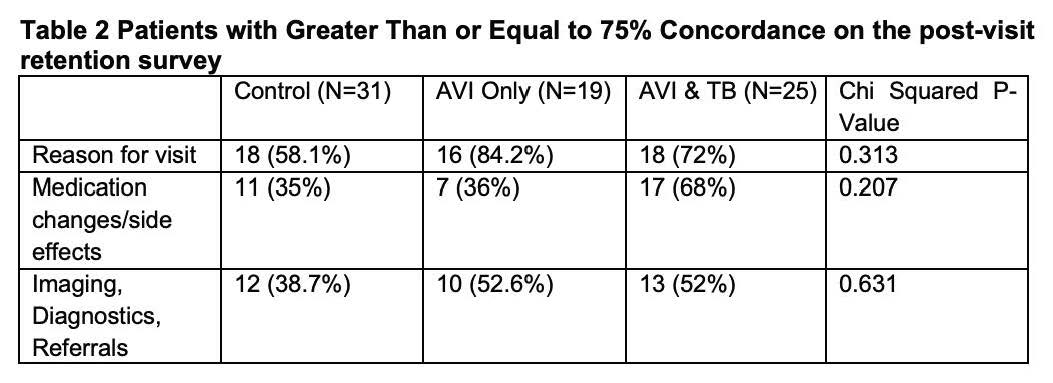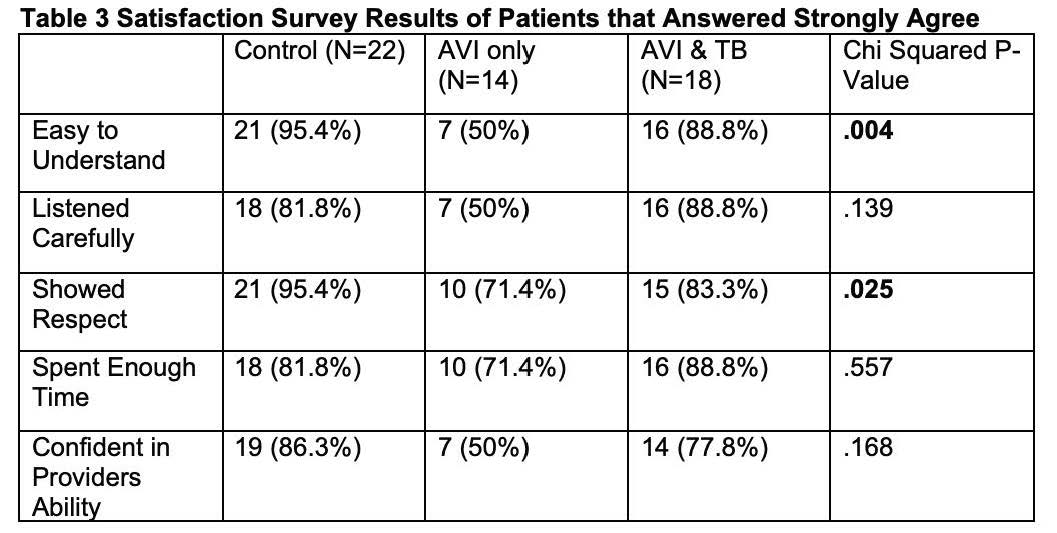Session Information
Date: Tuesday, November 14, 2023
Title: (1895–1912) Measures & Measurement of Healthcare Quality Poster II
Session Type: Poster Session C
Session Time: 9:00AM-11:00AM
Background/Purpose: As low health literacy (HL) has been linked to poor health outcomes in rheumatic diseases, it is important to optimize organizational HL. One way of doing this might be through the delivery of after visit instructions (AVI) which are personalized instructions written by a provider & given to patients in the outpatient rheumatology setting. An initial needs assessment revealed that only 25% of patients received AVI at our institution. Herein, we aimed to evaluate the effectiveness of two after visit interventions aimed at improving the delivery, comprehension, & retention of management plans for patients in an academic rheumatology clinic.
Methods: This was a prospective, randomized, proof-of-concept study. Patients scheduled for clinic visits were randomized into three groups: control group (standard of care), standardized AVI only (templated personalized AVI), & standardized AVI plus Teach back (TB). In TB, the patient repeats management changes to the provider in their own words. Patients completed an Arthritis Rapid Estimate of Adult Literacy in Medicine (A-REALM) questionnaire, to assess rheumatology health literacy. A telephone survey was conducted 1-2 weeks after their clinic visit to assess retention & comprehension in three categories: reason for visit, medication changes, & referrals/further testing. The primary outcome of the study was correspondence between patient responses & the plan outlined in the provider management plan. Patient satisfaction was assessed as a secondary outcome. AVI readability was evaluated using Flesch-Kincaid (FK) scores.
Results: 75 patients completed the study with 31 (41.3%) in the control group, 19 (25.3%) in the AVI only group, & 25 (33.3%) in the AVI w/ TB group. Demographics are shown in Table 1. Mean age was 56.7 years. The mean A-REALM was 61.83 which equated with a high school HL. Among the patients with >75% concordance between their responses & the provider’s note, there was no difference across the three AVI groups in any of the categories evaluated: reason for visit, medication changes, & referrals (Table 2). Of the 54 patients that completed the satisfaction survey, more patients in the control group responded ‘strongly agree’ to “the doctor was easy to understand” & “the doctor spent enough time with me” (Table 3). The mean FK readability scores were significantly better in the control group than the intervention groups (p < 0.001). Of the patients that were provided personalized AVI only 55% acknowledged receiving them & of those 70% endorsed reading them.
Conclusion: Presence/type of AVI had no significant impact on patient’s retention or comprehension regarding their disease or management.Unexpectedly, the readability of AVI & components of satisfaction were better among controls than the other two groups. This may potentially be attributed to more direct patient engagement, & the AVI being brief & simpler in the control group. Further research addressing the limitations of this study could allow us to understand the utility of these patient education strategies to optimize after visit processes.
To cite this abstract in AMA style:
Joseph D, Hu R, Min R, Jolly M, Hassan S. Patient After Visit Instructions at a University Rheumatology Outpatient Clinic: Do They Make a Difference? [abstract]. Arthritis Rheumatol. 2023; 75 (suppl 9). https://acrabstracts.org/abstract/patient-after-visit-instructions-at-a-university-rheumatology-outpatient-clinic-do-they-make-a-difference/. Accessed .« Back to ACR Convergence 2023
ACR Meeting Abstracts - https://acrabstracts.org/abstract/patient-after-visit-instructions-at-a-university-rheumatology-outpatient-clinic-do-they-make-a-difference/



